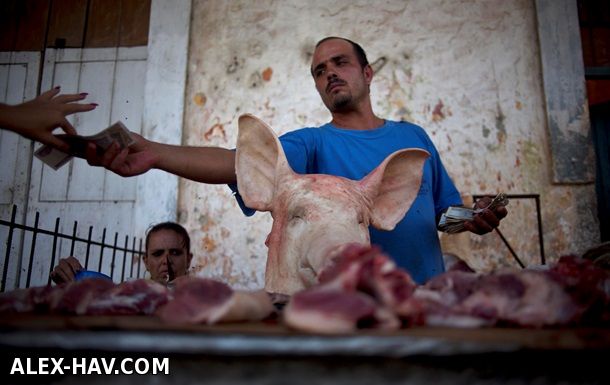08:21 The consequences of the Russian embargo: European breeders suffer losses | |

European pork producers affected by the current more than a year of the ban on the importation of their products to Russia in the coming days will receive financial support from the European Union. On Tuesday, February 24 Brussels approved the organization of the private storage of excess pork, which were formed in the market due to the introduction of the embargo by Moscow. This means that European authorities will pay to producers of meat subsidies to compensate for costs arising from the storage of unsold products.
Many EU countries welcomed the plans: they hope that the opening of private storage will allow them to offset losses from the fall in export volumes. However, German manufacturers have criticized the introduction of the proposed measures: in their view, it is untimely and will have a short-term effect. Pig producers suffer losses At the end of January 2014 after the discovery in Lithuania and Poland cases of African swine fever Moscow imposed a ban on pork imports from EU countries. A few months later, in August, the Russian authorities in response to Western sanctions announced an embargo on the import of meat and meat products from the EU. As a result of loss of Russia as one of the most important markets in European pig farmers an excess of production, which in turn led to a sharp decline in pork prices in the EU. Russian embargo cost European pig industry about 2 billion euros of losses. In particular, for the French pig farmers cumulative damage from lost markets and falling prices was 500 million euros, reports Reuters. Polish producers, according to agency AFP, demand from European authorities to compensate for a loss of 26 million euros. According to estimates of the German firm AMI, specializing in the analysis of the market of agricultural products, in Germany, farmers have lost around 800 million euros. "The most effective of the available tools""Russian import barriers in conjunction with an increase in production in the EU have led to a significant decline in prices in all European markets - said in a statement released on February 24 on the site of agricultural department of the European Commission. - Many manufacturers several months record negative revenues, farmers are experiencing serious difficulties with liquidity ". According to the European Commission, the price of pork in the EU for six months remain 15 percent below the average for 5 years. To support prices and indemnify breeders, the European Union in response to requests from a number of countries - including France and Denmark - decided to open the private storage of surplus meat. According to European Commissioner for Agriculture Phil Hogan, this measure - "the most effective tools available." Organization of private storage would "remove from the market a significant amount of product", which should stabilize the financial situation of farmers and contribute to the restoration of prices, said Hogan, whose words are listed in the press release of the European Commission. Private storage of excess meat starts next week, the statement said. Manufacturers can send the deposit of meat and meat products for a period of from 90 to 150 days. For the costs, according to a statement, the European Commission allocates a fixed amount of money. So, for ham subsidies will vary from 254 to 278 euros per tonne for a period of 90 and 150 days, respectively. German breeders againstMeanwhile, the German industry associations were subjected to sharp criticism of Brussels plans. As an argument, they point to favorable pricing trends that have emerged in the market in recent weeks. "Prices rose, so now support such a measure is impractical. It will not bring lasting relief market" - said in comments the German Union of farmers (DBV), sent a response to a request DW. "The downward trend seems to be broken, - agree in the Association of pig farms in Germany (ISN). - Subsidized storage of pork only postpone the solution to the problems of the market." In 2013, the EU exported to Russia pork for 1 billion euros. Of these, 240 million euros came from the German pig farmers, according to the DBV. This quarter the supply of pork from Germany to countries outside the EU. Stabilization in the hands of farmersAfter the embargo German exports of pork to Russia in absolute numbers dropped from 179,000 tons in 2013 to 9,000 tons, which managed to bring in January 2014 prior to the entry into force of the ban, told DW expert ISN Kvaing Matthias (Matthias Quaing). As a result, the sales prices on the German pork fell by 16 cents per kilogram (or 9.4 percent) compared to the 2013 year, he added. Export prices fell by 14 cents per kilogram, which corresponds to a fall of 6 per cent. Organization subsidized by Brussels storage is unlikely to help stabilize prices for a long time, doubt industry associations. At the end of the program provided support to the shelf life of meat refrigerators sent in return to the market, stated in the ISN. These volumes will go on the market in time for the summer, when demand will weaken due to seasonal factors, stressed in an interview with DW head of the Federal Union of German meat industry Vogelsang Thomas (Thomas Vogelsang). Lack of demand in excess of production once again bring down prices, he warned. According to industry associations in Germany, to stabilize European breeders must develop new markets: it would be a good alternative to obtain a temporary support from the authorities. | |
|
| |
| Total comments: 0 | |